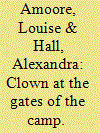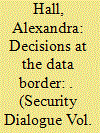| Srl | Item |
| 1 |
ID:
119950


|
|
|
|
|
| Publication |
2013.
|
| Summary/Abstract |
This article considers the figure of the clown-fool as a way of approaching anew contemporary practices of sovereignty and resistance. The spectre of the camp as the nomos of modern sovereign power is widely critiqued for its neglect of the thriving and teeming life that actually accompanies the declaration of exception. The clown is an errant and troublesome figure whose life haunts the sovereign decision on exception. His presence in border-camp activism invokes a rich, provocative history in which the clown's foolish wisdom has critiqued the conceits of power. Yet, the clown's significance exceeds his traditional associations with carnivalesque misrule and mockery. Like homo sacer, the clown occupies an ambiguous position between political inclusion and exclusion, between inside and outside. In short, the sovereign needs the clown. His relation to resistance is thus also complex. The clown does not turn to face a locus of power as though it could be countered or overturned. Rather, he is the example par excellence of the resistance always already present within the exercise of power: standing not inside or outside the gates, but looking through, he dwells within the court but is not of its making. As a singularity akin to Deleuze's figurative children and Agamben's tricksters, the clown troubles the division between interior and exterior on which sovereign political life rests, a division that is also frequently replicated in understandings of resistance.
|
|
|
|
|
|
|
|
|
|
|
|
|
|
|
|
| 2 |
ID:
157100


|
|
|
|
|
| Summary/Abstract |
Discussions about the legitimacy of private security companies (PSCs) in multilateral military interventions abound. This article looks at how the United States has sought to legitimize the outsourcing of security services to PSCs through performance-based contracting and performance assessments. Both mechanisms aim to demonstrate the effective provision of publicly desirable outcomes. However, the immaterial and socially constructed nature of security presents major problems for performance assessments in terms of observable and measurable outcomes. Performance has therefore given way to performativity – that is, the repetitive enactment of particular forms of behaviour and capabilities that are simply equated with security as an outcome. The implications of this development for the ways in which security has been conceptualized, implemented and experienced within US interventions have been profound. Ironically, the concern with performance has not encouraged PSCs to pay increased attention to their impacts on security environments and civilian populations, but has fostered a preoccupation with activities and measurable capabilities that can be easily assessed by government auditors.
|
|
|
|
|
|
|
|
|
|
|
|
|
|
|
|